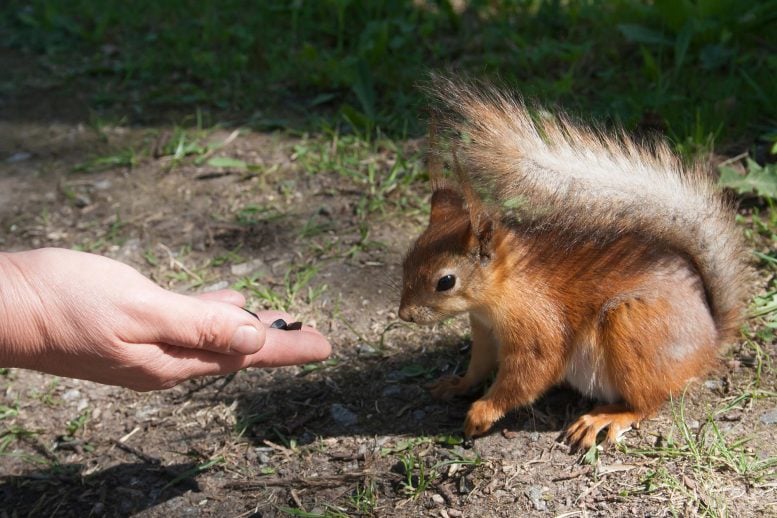
A groundbreaking study reveals that interacting with wildlife helps ease <span class="glossaryLink" aria-describedby="tt" data-cmtooltip="
” data-gt-translate-attributes=”[{“attribute”:”data-cmtooltip”, “format”:”html”}]” tabindex=”0″ role=”link”>PTSD symptoms in veterans.
Walking in forests was beneficial, but direct engagement with animals — especially when the animals initiated contact — was even more impactful. Participants found a sense of connection and healing, while also growing more aware of conservation issues. Scientists suggest expanding research to further explore this nature-based therapy.
Healing PTSD Through Nature and Wildlife
A new study published today (March 6) in Human-Animal Interactions found that spending time in nature — particularly engaging with wildlife and walking in forests — can help reduce PTSD symptoms in U.S. war veterans.
Researchers from UMass Chan Medical School studied 19 veterans with PTSD or PTSD symptoms and observed that activities such as forest walks, wildlife care at a rehabilitation center, visiting a wildlife sanctuary, and birdwatching led to notable psychological benefits, particularly reduced anxiety.
To help maintain their connection with nature after the nearly four-month study in Massachusetts, participants received bird feeders. The research included visits to Maine Wildlife Park, walks through Harvard Forest, and educational sessions on bird identification at the Mass Audubon Broad Meadow Brook Conservation Center and Wildlife Sanctuary.
Immersion in Wildlife Settings Brings Greater Benefits
Finding of the study suggest that the veterans benefited more from their immersion in wildlife settings – including coming up close with a Sulcata tortoise at the New England Wildlife Center – than a forest walk.
Dr. Donna Perry, UMass Chan Medical School, said, “While many studies involving interactions between humans and other <span class="glossaryLink" aria-describedby="tt" data-cmtooltip="
” data-gt-translate-attributes=”[{“attribute”:”data-cmtooltip”, “format”:”html”}]” tabindex=”0″ role=”link”>species aimed at improving psychological or physical health have involved domestic animals, few have focused on wildlife.
“We found that the response of veterans with PTSD to wildlife immersion suggests improved psychological symptoms as well as connection to nature/wildlife and increased understanding and concern for animal welfare and conservation-related issues.
“Nature-based interventions are dynamic and require a flexible design, which may be addressed through immersion experiences.”
The Power of Animals Choosing to Interact
Dr. Perry said the participants in the study reflected that interactions with wildlife were especially meaningful when animals chose to engage with humans.
One participant said, “Because animals are just- There’s no control . . . They have their own free will. Got their own way of thinking and doing things, so if they like you . . . there’s a feeling of feeling connected with nature.”
Another individual described a similar spontaneous encounter in her post-study journal. “I sat on the patio and I saw a red squirrel running by. He stopped and looked at me, I thought he was so cute. I really felt connected to him.”
In some cases, participants seemed to identify with animals, such as an individual who was assisting to feed a baby grey squirrel through a syringe. In this case, a technician held the squirrel for the participant as it was reported to be “a biter.” As she fed the squirrel the participant said, “He’s the black sheep. He’s probably related to me. He’s beautiful.”
Healing Through Shared Experiences of Struggle
Dr. Perry said, “The findings also suggest that improvements in depression and wellbeing may be mediated through transcendent feelings in response to the human-wildlife interactions.
“The study supports that placing veterans in an environment where they can connect with animals that have also undergone loss, and suffering may foster healing in the veterans themselves.
“Being exposed to and assisting with care of injured wildlife also raises awareness of the effects of humans on the environment and may enhance conservation attitudes. This suggests that settings providing wildlife care and public education may be mutually beneficial for both human and beyond-human animals.”
Future Research: Expanding Animal-Assisted Therapies
The scientists say that future research with larger numbers of participants would be helpful to more deeply explore mutual benefits for humans and animals within specific realms of interaction, such as physical contact through animal care or reminiscing through the extended realm.
They add that additional studies would be also helpful to explore animal-assisted therapies in which formal therapeutic interventions are included with the wildlife immersion.
Reference: “Wildlife and Wellbeing: Wildlife Immersion Experiences in Veterans with PTSD” by Perry, Donna J.; Crawford, Sybil L.; Averka, Jesse J.; Mackin, Jill M.; Granger, Douglas A.; Smelson, David A, 6 March 2025, Human-Animal Interactions.
DOI: 10.1079/hai.2025.0006
